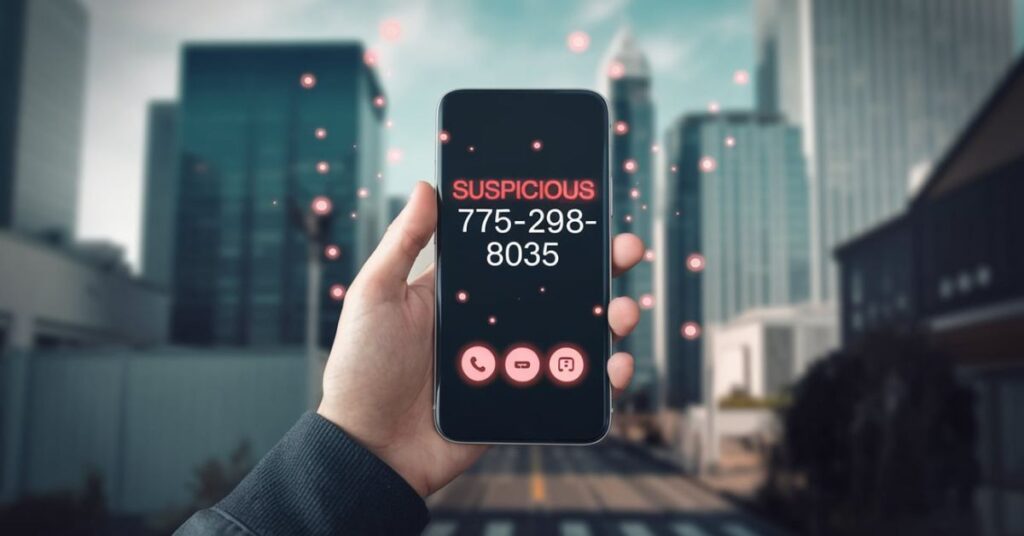775-298-8035 Is It a Scam: Comprehensive Analysis

In an era where scams are increasingly sophisticated, it’s essential to remain vigilant when confronted with suspicious phone numbers. One such number that has raised concerns is 775-298-8035. This article will delve deeply into whether this number is associated with scams, offering detailed analyses, practical advice, and unique insights that go beyond standard online sources. Our aim is to provide a thorough and accessible guide to help you navigate potential threats.
What is 775-298-8035?
775-298-8035 is a phone number originating from the 775 area code, which covers parts of Nevada, including cities such as Reno and Carson City. While this area code itself isn’t inherently suspicious, the use of this number has prompted concerns among many individuals about its legitimacy.
The 775 Area Code
The 775 area code serves a significant portion of Northern Nevada, which includes a variety of communities and businesses. Despite its large service area, the presence of a number within this code doesn’t guarantee legitimacy. Scammers can easily use numbers from any area code, including those that appear local and familiar.
Understanding Phone Scams
Common Characteristics of Phone Scams
Phone scams can be highly deceptive. Recognizing common traits can help you identify and avoid falling victim to these schemes. Here’s a closer look at typical characteristics of phone scams:
- Unsolicited Calls: Scammers often make unsolicited calls, which means you didn’t request or expect to hear from them. They may claim to represent well-known organizations or services.
- Pressure Tactics: Scammers use high-pressure tactics to force you into making quick decisions, such as providing personal information or making payments. They often create a false sense of urgency.
- Too Good to Be True Offers: Scams frequently involve offers that seem too good to be true, such as prize winnings or exclusive deals. If it sounds too good to be true, it probably is.
- Threats or Fear Tactics: Scammers may use intimidation or threats to scare you into compliance. This might include threats of legal action, arrest, or other severe consequences.
Types of Phone Scams
Understanding the different types of phone scams can help you recognize and avoid them. Here are some common types:
- Phishing Scams: These scams aim to gather personal information by pretending to be from a reputable organization, such as a bank or government agency. They may ask for sensitive details like Social Security numbers or account passwords.
- Impersonation Scams: Scammers might impersonate figures of authority, such as IRS agents or law enforcement officers, to lend credibility to their scheme. They often threaten legal action or arrest to coerce victims.
- Robocalls: Automated calls that deliver pre-recorded messages, often advertising fraudulent services or requesting personal information. These calls can be particularly tricky as they may appear to come from legitimate organizations.
Analyzing 775-298-8035: Is It a Scam?
Investigating the Caller ID
Caller ID can offer clues about the legitimacy of a call, but it’s important to note that scammers often use spoofing techniques to disguise their real number. Here’s what to consider when analyzing a call from 775-298-8035:
- Unfamiliar Numbers: If you don’t recognize the number and it’s not associated with a contact or business you know, it’s wise to be cautious. Scammers often use numbers that appear local or familiar.
- No Voicemail: Legitimate callers typically leave a voicemail if they have a valid reason to contact you. If the caller doesn’t leave a message, it could be a sign of a scam.
User Reports and Feedback
One effective way to assess the legitimacy of a number is by looking at user reports and feedback. Websites like WhoCallsMe, CallerSmart, and PhoneLookup collect and publish user-generated reports about suspicious numbers. These reports can provide valuable insights into the nature of the calls and their potential risks.
Examples of User Reports
- Report 1: A user reported receiving a call from 775-298-8035 claiming to be from a tech support company, offering to fix a non-existent computer issue. The user, suspicious of the offer, ended the call and later verified with their tech support provider.
- Report 2: Another user mentioned receiving multiple calls from 775-298-8035 offering exclusive investment opportunities. The user, concerned about the legitimacy of the offer, chose not to engage and reported the number to the FTC.
Example Cases and Experiences
Real-life experiences can offer additional context about a number’s reputation:
- Case Study 1: One individual received a call from 775-298-8035 that claimed to be from their bank, asking for verification of account details. The individual, feeling uncertain, opted not to provide any information and instead contacted their bank using the number found on their bank statement.
- Case Study 2: Another person received repeated calls from this number offering deals on home services. The offers seemed unusually low-priced and high-pressure, raising suspicions about their authenticity.
Practical Steps to Take
What to Do If You Receive a Call from 775-298-8035
If you receive a call from 775-298-8035 and are unsure of its legitimacy, consider the following steps:
- Let It Go to Voicemail: Allowing the call to go to voicemail is a safe first step. Most legitimate callers will leave a message explaining the purpose of the call.
- Do Not Share Personal Information: Avoid providing any personal or financial information during unsolicited calls. Legitimate organizations will not request sensitive information in this manner.
- Verify the Caller: If the call seems important, verify the caller’s identity independently. Contact the organization or person using verified contact information rather than relying on the number provided in the call.
- Report Suspicious Calls: Report any suspicious or fraudulent calls to the Federal Trade Commission (FTC) or your local consumer protection agency. This helps authorities track and address scams.
Tools and Resources
Several tools and resources can help you manage and block unwanted calls:
- Caller ID Apps: Applications like Truecaller, Hiya, and Nomorobo can help identify and block spam calls. These apps often use databases of known scam numbers and user reports to filter out unwanted calls.
- National Do Not Call Registry: Registering your number with the National Do Not Call Registry can reduce the number of unsolicited telemarketing calls you receive.
Additional Resources
- FTC’s Consumer Information: The Federal Trade Commission provides valuable information on how to recognize and report scams. Visit their website for tips and resources.
- Your Phone Provider: Many phone service providers offer tools and services to block unwanted calls. Contact your provider to learn about available options.
Why Scams Persist and How to Stay Safe
The Evolution of Scams
Scammers continually adapt their techniques to evade detection and exploit new opportunities. They use various tactics to make their schemes appear more convincing and legitimate. Staying informed about common and emerging scams is essential to protecting yourself.
Tips for Staying Safe
To safeguard yourself from phone scams, consider the following tips:
- Educate Yourself: Stay informed about common scam tactics and current scams in your area. Awareness is key to recognizing and avoiding fraud.
- Be Skeptical: Always approach unsolicited calls with caution, especially if they involve requests for personal information or financial details.
- Secure Your Personal Information: Be cautious about sharing personal information online or over the phone. Use strong, unique passwords and monitor your accounts regularly for suspicious activity.
Related FAQs
What should I do if I answered the call from 775-298-8035?
If you answered the call and provided personal information, it’s crucial to monitor your accounts for any unusual activity. Contact your bank or credit card company to alert them of the potential breach and consider placing a fraud alert on your credit report. Reporting the incident to the FTC and other relevant authorities is also a good step.
How can I block calls from 775-298-8035?
Most smartphones and phone service providers offer options to block unwanted numbers. You can block the number directly on your phone or use third-party apps designed to filter out spam and scam calls. Additionally, check with your phone service provider for additional blocking features.
Can scammers use legitimate area codes?
Yes, scammers can use spoofing techniques to disguise their true number and make it appear as though they are calling from a legitimate area code. This makes it challenging to rely solely on caller ID to determine the legitimacy of a call.
Is it safe to call back numbers that I don’t recognize?
Generally, it’s not advisable to call back unknown numbers. Scammers may use this tactic to verify that your number is active and potentially sell it to other scammers. If the call was important, the caller should have left a voicemail or provided alternative contact information.
How can I report a suspicious call?
You can report suspicious calls to several organizations:
- Federal Trade Commission (FTC): Visit the FTC’s website to file a complaint and report fraudulent activity.
- Consumer Financial Protection Bureau (CFPB): Report scams related to financial products or services to the CFPB.
- Local Authorities: Contact your local consumer protection agency or law enforcement if you believe you have been targeted by a scam.
Conclusion
In conclusion, while there is no definitive evidence proving that 775-298-8035 is a scam, exercising caution when dealing with unknown or unsolicited calls is always wise. By understanding common scam tactics, utilizing available tools, and following best practices for phone safety, you can protect yourself from potential fraud. Stay informed, remain vigilant, and don’t hesitate to seek assistance if you suspect you’ve encountered a scam.
By applying the insights and advice provided in this article, you can confidently handle calls from unfamiliar numbers and safeguard your personal information from fraudulent schemes. Remember, knowledge and vigilance are your best defenses against scams.





